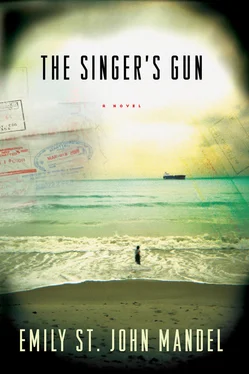That was the year Gary introduced Anton to cigarettes, which they felt conveyed a certain hard glamor. The technique was to squint into the distance and smoke as if you’d been smoking for so long that you hardly noticed the cigarette anymore and in fact had no idea how it had ended up in your hand. They practiced smoking under the bridge, separated from Anton’s parents’ store by several hundred yards and an array of enormous concrete pilings.
“You know your cousin steals?” Gary asked once, when the cigarettes were lit. He passed one to Anton, who took it gingerly — the thing he didn’t like about cigarettes was that one end was hot — and used it to stall for time.
“She’s fucked up,” he said, after he’d exhaled, when it became apparent that Gary was waiting for an answer. “I’m sorry. I can’t stop her.”
But he realized as he spoke that he didn’t really want to. Every time he thought of her he was shot through with strange envy. She was six months older but miles ahead.
Aria had a way of staring at the river while she smoked her cigarettes. Standing in front of the store, under the awning when it was raining. One hand in her pocket, the other holding her cigarette, and she lit one cigarette after another and looked out at nothing, or at Ecuador.
Anton’s and Aria’s sole chore around the apartment was to do the dishes, because his parents liked to read after dinner. When the dishes were done Aria usually disappeared into the demands of her private life, going out with friends who exchanged inscrutable jokes in rapid-fire Spanish or closing herself in her room and listening to music with the volume turned down low. She saved and saved and bought her own CD player. Anton’s father was willing to put down his book to have a conversation if he saw Anton hovering around, but there were two or three hours after dinner when his mother was lost to them; she read with all of herself, immersed, breathing language, and couldn’t be reached until she was ready to emerge.
When he didn’t have plans with anyone he closed himself into his bedroom to read after dinner, or stayed with his parents in the living room. Anton resented the absence of a television, but there were things he read in books that took his breath away. His mother’s collection of travel guides never moved him, but Kirkegaard’s last words were Sweep me up. He read those three words when he was fifteen years old and his eyes filled unexpectedly with tears.
It was his mother’s absence in the evenings that made Sundays important. When it was warm enough she sat with him on the loading dock in front of the store, watching the boats on the river and Manhattan on the other side. Anton would go out by himself around ten and after a few minutes she came to join him with two mugs of coffee, and they sat there together for an hour or so. They didn’t talk much; the point was contemplation and silence. In winter they drank coffee in the store, where there were two old chairs behind the counter that were too comfortable to sell, but it wasn’t the same as watching the river.
“Does it bother you ever?” he asked her once. “The way we do things?”
“I’m not sure what you mean.” It was a Sunday morning, almost noon. He was fifteen years old and they were watching a Brooklyn-bound J train passing over the Williamsburg Bridge. The warehouse was so close to being under the bridge that at a certain point any approaching subway train disappeared overhead.
“I know a lot of it’s stolen,” Anton said. “The stuff we sell.”
“True,” said his mother. She had finished her coffee and she held the empty mug clasped loosely in her hands. She was looking at Manhattan, or looking through Manhattan at something else. There were moments when Anton’s parents seemed very far away from him.
“Doesn’t it bother you?”
“No,” she said. “Does that disappoint you?”
“I don’t know. Maybe.”
She was quiet for a while. “Your grandfather was an official in the Church of Latter-Day Saints. He was a well-respected man, one of those pillar-of-the-community types, but he was terrifically cruel in his personal life. I ran away at sixteen. Was he moral? He thought so. He operated a soup kitchen and a shelter for the homeless during the winter and probably saved lives. There are probably people alive today who were homeless in Salt Lake City in the ’60s, and they didn’t freeze to death in the winter because of him. Or my sister,” she said. “We’ve had a few misunderstandings, so you haven’t seen her since you were tiny, but she’s a wonderful woman. She was on welfare because she had three little kids to take care of, and her ex-husband never did pay child support. Once there was a bureaucratic error and she received two welfare checks for the same month. She spent the extra money on new winter coats and boots for the kids and a radio, and her ex-husband found out and threatened to report her for welfare fraud unless she stopped pestering him for child support. Was she immoral? Was what she did wrong? I frankly don’t believe so, my beloved child. My point is that it isn’t black-and-white, what we do or what anyone else does in this world.”
“We deal in stolen goods.”
“We deal in goods that would in all likelihood be destroyed anyway. We’re a salvage operation.”
“But stolen . We don’t know they’ll be destroyed. Someone else might be planning to save them, and we don’t own them. They’re not ours .” He blinked and was humiliated to realize that he was ready to cry. He clenched his coffee cup with both hands to steady himself. Adolescence had made him embarrassingly emotional.
“Anton,” she said, “sweetheart, I know it’s questionable. But we work hard. I’m at peace. Your father’s at peace. We sleep well at night. What are our options?”
“Normal jobs?”
“Normal jobs,” she repeated. Her voice held an edge. “You’ve never worked a normal job, Anton. What do you imagine it might be like?”
“I don’t know. Less questionable.”
“Well, most things you have to do in life are at least a little questionable,” she said. She stood abruptly, took his coffee cup from his hands and left him alone on the loading dock.
The day after he stole the singer’s gun Anton went down to the piazza and called Gary.
“You want me to kidnap your cat,” Gary repeated.
“Not kidnap , exactly.” Anton had purchased aspirin with great difficulty at a pharmacy near the hotel — the pharmacist didn’t speak English, which necessitated a brief game of charades at the counter — but his headache wasn’t entirely gone yet. The sharp light of afternoon made him want to go to bed with the curtains drawn, and the gun was a malignant presence in the top dresser drawer in the hotel room. “I mean, he’s my cat, it’s not like you’re stealing him.”
“Oh, so I’m not kidnapping him in the technical sense of the word, I’m just breaking into your apartment, extracting your cat, and then putting it in a crate and shipping it to Italy. Cool.”
“No, I’d send you my house keys. No break and enter involved.”
“Oh, okay. That changes everything .”
“Look, and I’d pay your expenses and all the shipping — we’re clear about that, right? I’ll throw in another fifty for your time if you want. A hundred. Make it a hundred, okay? A hundred dollars for two hours of your time.”
“Thanks, but why don’t you keep the money and buy a new cat?”
“Because I already have a cat. Jim isn’t replaceable.”
“Yeah, look, it’s just a little crazy for me. Isn’t there anyone else you could call?”
“You’re my best friend. Who else would I call?”
Читать дальше





![Ричард Деминг - Whistle Past the Graveyard [= Give the Girl a Gun]](/books/412176/richard-deming-whistle-past-the-graveyard-give-t-thumb.webp)






